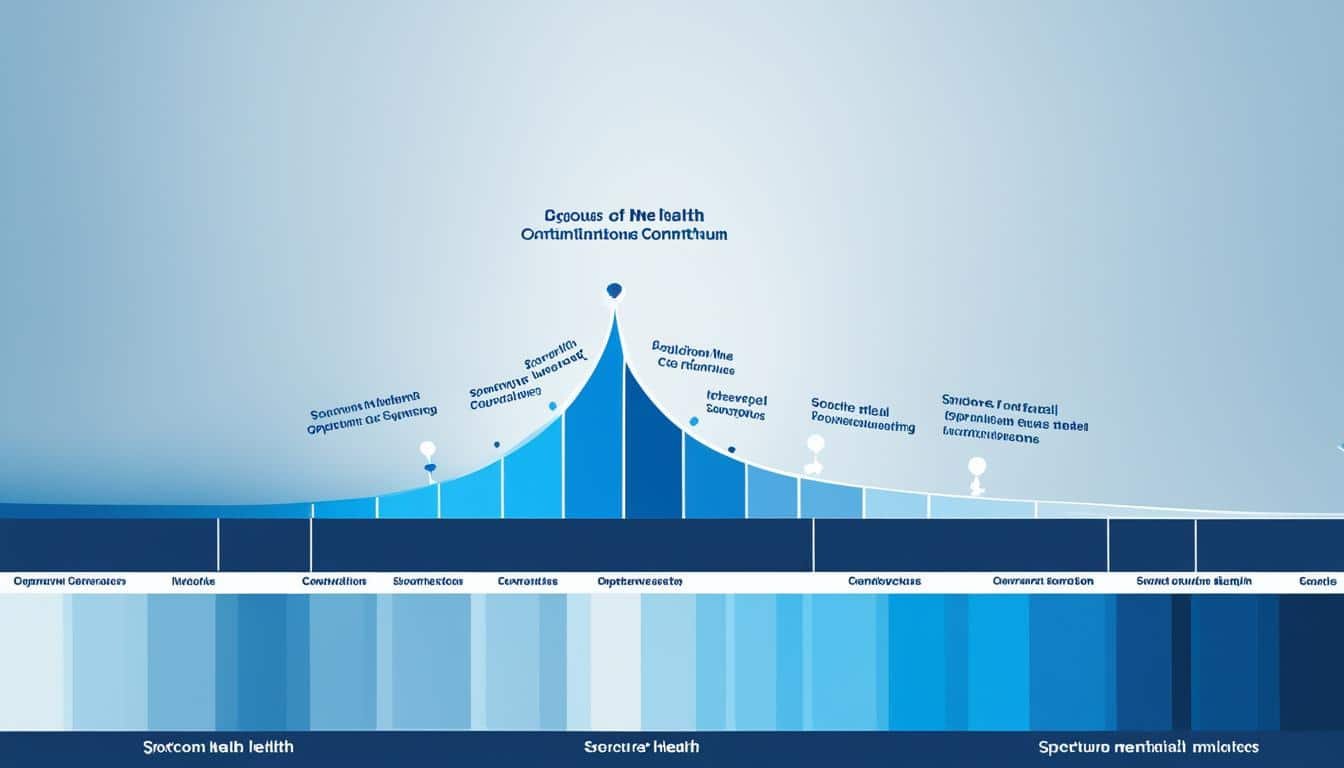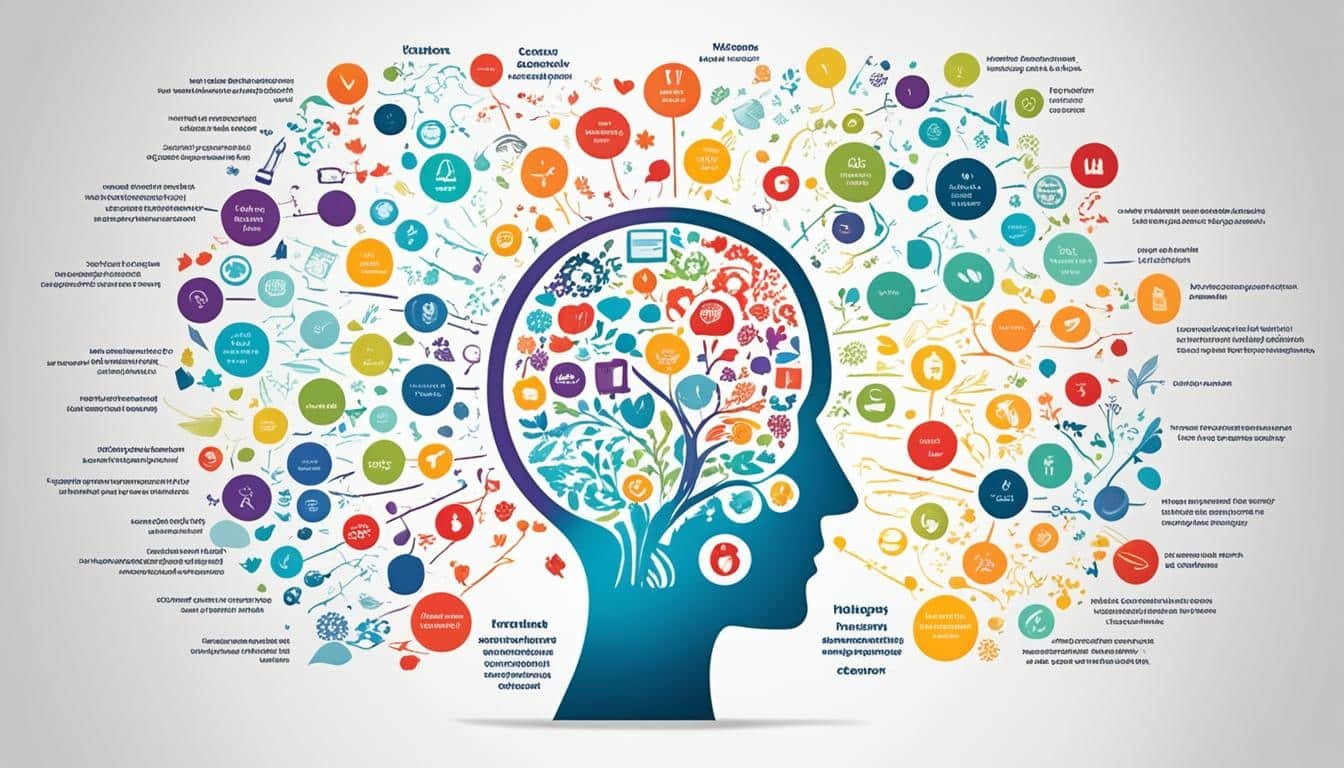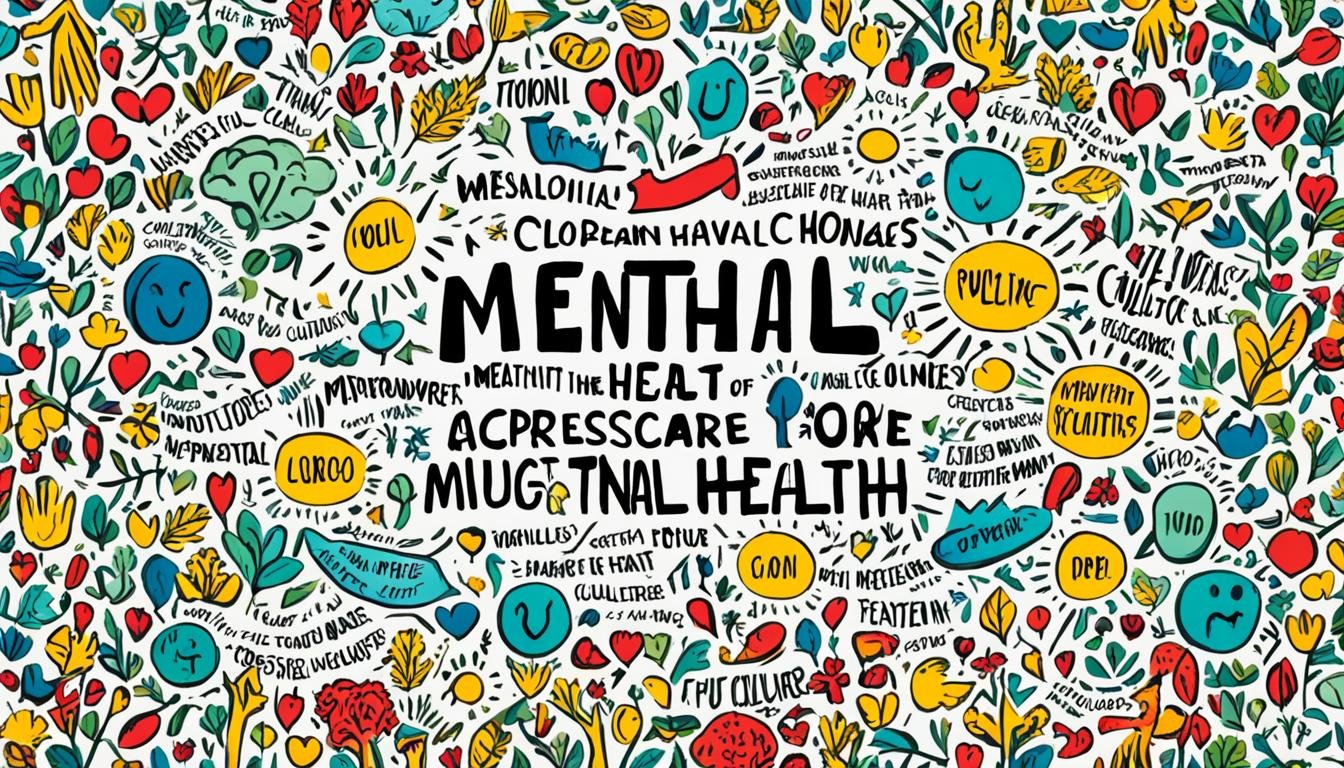Mental health is key to our overall health and happiness. It covers our feelings, thoughts, and how we connect with others. It shapes how we handle stress, interact with people, and make choices.
According to the National Institute of Mental Health (NIMH), over 1 in 5 U.S. adults deal with a mental illness. The Centers for Disease Control and Prevention (CDC) say more than half of Americans will get a mental illness at some point. Mental and physical health go hand in hand, as mental issues can lead to physical problems, and vice versa.
Good mental health is vital at every life stage, from being young to being older. It’s important for everyone, from kids to adults.
Key Takeaways
- Mental health is a crucial component of overall health and well-being.
- Mental health issues are widespread, with over 20% of U.S. adults living with a mental illness.
- Mental and physical health are interconnected, with mental health problems increasing the risk of physical health problems.
- Maintaining good mental health is important at all stages of life.
- Investing in mental health care is crucial for improving individual and public health outcomes.
Also Read : What Are The Benefits Of Healthy Food?
Understanding Mental Health
Mental health is more than just being free from mental disorders. It’s about feeling good in your life, having strong relationships, and reaching your goals. It’s about your emotional, psychological, and social health all working together.
Mental health means you can handle life’s ups and downs with strength and hope. It’s shaped by your feelings, thoughts, and how you connect with others. These factors help you stay well and do well in life.
Also Read : How Can Vegan Food Contribute To A Balanced Diet?
What is Mental Health?
The U.S. Department of Health and Human Services defines mental health as being emotionally, psychologically, and socially well. Being in good mental health means you feel positive, can do daily tasks, keep up relationships, and enjoy activities. You also have balance and can set limits and work towards your goals.
Mental health is complex and can be affected by many things. It’s not just about avoiding mental disorders. It’s a key part of being healthy and happy.
Also Read : How Do Financial Services Benefit For Businesses?
| Aspect of Mental Health | Description |
|---|---|
| Emotional Well-being | The ability to recognize, express, and manage emotions effectively. |
| Psychological Well-being | The capacity to make meaningful decisions, set and achieve personal goals, and develop a sense of purpose. |
| Social Well-being | The ability to build and maintain healthy relationships, and contribute positively to one’s community. |
Mental Health and Overall Well-being
Mental and physical health are closely linked, each playing a key role in our overall health. The National Institute of Mental Health (NIMH) says some mental illnesses show up as physical symptoms. On the other hand, the Centers for Disease Control and Prevention (CDC) note that chronic physical issues can lead to mental health problems.
Things like a healthy diet, good sleep, and exercise help our mental health. Without them, managing stress and life’s challenges becomes harder. This shows how mental and physical health affect each other, with mental issues causing physical ones, and vice versa.
Also Read : What Are The Benefits Of Using Technology In Finance Management?
It’s important to look at health from a whole perspective. Mental health is as crucial as physical health. By understanding the link between mental and physical health, we can tackle both mental and physical symptoms better.
“The greatest weapon against stress is our ability to choose one thought over another.” – William James
Also Read : How Can Cardio Exercises Help With Weight Loss?
Prevalence of Mental Illnesses

In the United States, mental illnesses are very common. The National Institute of Mental Health (NIMH) says over 1 in 5 U.S. adults, or more than 50 million people, have a mental illness. This shows how common mental health issues are in the country.
The Centers for Disease Control and Prevention (CDC) also found that about 1 in 25 U.S. adults, or around 10 million people, have a serious mental illness. These include conditions like schizophrenia, bipolar disorder, or major depression. These serious issues can make it hard for people to do everyday tasks.
Moreover, the NIMH says over 1 in 5 young people (ages 13-18) have had a serious mental illness at some point. This highlights the need to focus on mental health in young people. It’s crucial for their well-being and growth.
| Mental Health Condition | Prevalence in U.S. Adults |
|---|---|
| Any Mental Illness | 20.6% (over 50 million people) |
| Serious Mental Illness | 4.9% (around 10 million people) |
The high number of mental illnesses in the U.S. shows we need better mental health care and support. It’s a big public health issue we must tackle.
Causes and Types of Mental Illness

Mental illnesses come from many things like bad childhood experiences, ongoing health issues, brain imbalances, and substance use. These risk factors for mental illness can lead to different mental health problems.
Factors Contributing to Mental Illness
Bad experiences in childhood, like trauma or abuse, can deeply affect someone’s mental health. Medical conditions and brain imbalances can also cause mental health conditions. Using alcohol or drugs can make these problems worse and lead to mental health disorders.
Common Mental Health Disorders
Mental illnesses show up in many ways, from short-term episodes to ongoing issues. Some common types of mental illness include:
- Anxiety disorders
- Depression
- Post-traumatic stress disorder (PTSD)
- Addiction
- Psychotic disorders
- Obsessive-compulsive disorder (OCD)
- Eating disorders
- Mood disorders like bipolar disorder
Knowing the causes of mental illness and the different mental health disorders is key. It helps us meet the mental health needs of people and communities.
“Mental health is not just the absence of mental illness, but a state of well-being in which an individual realizes their own abilities, can cope with the normal stresses of life, can work productively, and is able to make a contribution to their community.”
Mental Health

Mental health is more than just feeling good. It’s about how we handle life’s ups and downs, reach our goals, and help others. It’s about being emotionally, psychologically, and socially healthy. The mental health definition is about being well enough to live a happy and productive life.
The mental health continuum shows us how our mental health can vary. It goes from being very well to having serious issues. Some people might just feel stressed sometimes, while others face ongoing challenges that make everyday tasks hard. But no matter the situation, keeping our mental health in check is key to staying strong.
Our mental health can change a lot, affected by many things around us and inside us. By understanding what mental health really means, we can help ourselves and others stay on top of our game. This is important for our overall health and how we bounce back from tough times.
“Mental health is not just the absence of mental illness, but a state of well-being in which an individual realizes their own abilities, can cope with the normal stresses of life, can work productively, and is able to make a contribution to their community.”
Determinants of Mental Health

Throughout life, many factors can affect a person’s mental health. These factors can be split into three main areas: individual, social, and structural. Each area plays a big role in how well someone feels mentally.
Individual and Environmental Factors
On the individual side, things like personality, biology, and behavior can make someone more likely to face mental health issues. Being good at handling emotions, avoiding harmful substances, and having a genetic history can all play a part. Also, being exposed to tough social, economic, and environmental conditions, like poverty or violence, can hurt mental health.
But, there are also things that can help. Having strong social and emotional skills, positive relationships, good education, a safe place to live, and a strong community can make someone more resilient. These factors can affect people at different times in their lives. Early childhood is especially important, as challenges during this time can have a big impact.
| Determinants of Mental Health | Risk Factors | Protective Factors |
|---|---|---|
| Individual Factors |
|
|
| Environmental Factors |
|
|
These individual, social, and structural factors can change how resilient someone is or make them more vulnerable. It’s all about how these factors interact with each other.
Mental Health Promotion and Prevention
Promoting and preventing mental health issues is key to overall well-being. It means looking at the personal, social, and structural factors that affect mental health. Then, we work to lower risks, build resilience, and create supportive places.
For effective mental health promotion and prevention, we need multisectoral collaboration. This means working with education, labor, justice, transport, environment, housing, and welfare, along with health. By tackling the social determinants of health, we can make real changes and help build resilience in communities.
Suicide prevention is a top global priority. We can fight it with evidence-based actions like limiting access to means, responsible media, and social and emotional learning for teens. Early help and support are key for child and adolescent mental health.
Workplace mental health is also vital, with workplace mental health promotion supported by laws, company plans, manager training, and programs for workers. By reducing risks and preventing mental health issues at work, employers help their employees’ overall well-being.
“Mental health promotion and prevention are essential for creating a society where everyone can thrive and reach their full potential.”
Mental Health Care and Treatment
It’s vital to help people with mental health issues. Using a community-based approach works well. This method is easier to get to and more liked than staying in hospitals. It also stops rights issues and helps people get better faster.
Community-Based Mental Health Care
Community mental health care should link many services together. This includes mental health in regular health care, community teams, and services in places like social centers. This way, people get help in places they know, making it easier to accept.
Mental health rehabilitation and peer support are big parts of this care. They help people learn to handle their mental health on their own. This way, they can take part in their recovery.
There’s a big mental health care gap for things like depression and anxiety. So, countries need new ways to offer care. Using non-specialist psychological counseling or digital self-help programs can help. These methods can reach more people and fill the gap in mental health services.
“Community-based mental health care is a more accessible and acceptable approach that helps prevent human rights violations and delivers better recovery outcomes.”
WHO’s Response to Mental Health

The World Health Organization (WHO) is leading the fight against the global mental health crisis. Every WHO Member State has promised to follow the “Comprehensive mental health action plan 2013–2030.” This plan aims to make mental health better around the world.
The plan has four main goals. It aims to strengthen leadership in mental health, offer better community care, and promote prevention. It also aims to improve information systems and research.
WHO’s “World mental health report: transforming mental health for all” urges countries to speed up the plan’s implementation. It focuses on three main areas: valuing mental health more, creating safer environments, and improving mental health care.
These efforts focus on protecting human rights and empowering people with mental health experiences. They also involve working together across different sectors to improve mental health worldwide. WHO’s mental health support and mental health care strengthening are key to making mental health better for everyone.
“Mental health is a fundamental part of our overall health and well-being, and it must be treated with the same urgency as physical health.”
– Dr. Tedros Adhanom Ghebreyesus, Director-General of the World Health Organization
Conclusion
Mental health is key to our overall well-being. It affects how we think, feel, and act. It helps us handle stress, connect with others, and make healthy choices. Sadly, many people in the U.S. struggle with mental health issues.
Over 1 in 5 adults and the same number of youth face mental health problems. Many factors influence mental health, but we can take steps to improve it. We can use community-based care, prevent mental health issues, and tackle the root causes.
The World Health Organization (WHO) has a plan to help us. It calls for a team effort from all sectors to better mental health. This plan guides us on how to make mental health a priority for everyone.
We need to keep spreading the word, reduce stigma, and make sure everyone gets the help they need. Together, we can make a future where mental health is seen as crucial. It will be a key part of being healthy and happy.
Also Read : How Does Exercise Impact Immunity?
FAQs
Q: Why is mental health care important?
A: Mental health includes our emotional, psychological, and social well-being. It helps determine how we handle stress, relate to others, and make choices. Mental health is important at every stage of life, from childhood and adolescence through adulthood.
Q: What are some warning signs of a mental health condition?
A: Warning signs of a mental health condition may include extreme mood changes, prolonged sadness, excessive fears, worries, or anger, social withdrawal, drastic changes in eating or sleeping habits, and substance abuse.
Q: How can celebrating 75 years of mental health information help individuals?
A: Celebrating 75 years of mental health information promotes awareness and education about mental health, helping individuals recognize the importance of seeking help when needed and reducing the stigma surrounding mental health conditions.
Q: Where can someone find help for mental health issues?
A: If you or someone you know is experiencing mental health problems, it is important to seek help from mental health services, a primary care provider, or access resources available through government websites like NIMH or SAMHSA.
Q: How can self-care contribute to overall mental health?
A: Self-care practices, such as regular exercise, healthy eating, sufficient sleep, mindfulness, and engaging in activities you enjoy, can positively impact your mental well-being and help manage stress and improve your overall mental health.
Q: What role does substance abuse play in mental health?
A: Substance abuse and mental health are often interconnected, as substance abuse can worsen mental health conditions and vice versa. Seeking appropriate treatment for both substance abuse and mental health is integral to recovery.
Q: Why is it important to be aware of the warning signs of mental health conditions?
A: Being aware of warning signs enables individuals to recognize when they or someone they know may be experiencing a mental health issue, leading to early intervention and access to necessary support and treatment.





